Annual highlights
Revisit key moments through ITU’s 2024 diary
January
We kicked off 2024 with the start of a new four-year strategic plan, centred on two key goals: Universal Connectivity and Sustainable Digital Transformation. These overarching objectives shape all ITU activities and initiatives. At the World Economic Forum in Davos, Switzerland, we engaged with global leaders on the critical need for digital technologies to accelerate sustainable development worldwide. Back at our headquarters in Geneva, ITU Council Working Groups and Expert Groups considered key items related to policies and strategies as well as financial and human resources in advance of the Council 2024 annual session.
February
We made an impact at the Mobile World Congress (MWC Barcelona) with our Partner2Connect Digital Coalition unveiling new investment pledges worth over USD 9 billion from mobile operator groups to connect the world’s hardest-to-reach communities. At the same time, our sector membership (consisting of companies, universities, research institutes and international and regional organizations) reached a new growth milestone, topping 1,000 entities globally.
At the SmallSat Symposium in Silicon Valley, our radiocommunications team exchanged valuable regulatory insights with leaders in one of the fastest-growing segments of the space and satellite industry.
Despite difficult global conditions, we were heartened by evidence of continued progress towards universal and meaningful connectivity – defined as the ability for anyone to go online under optimal conditions, at an affordable cost, anywhere and anytime – with low-income economies showing most improvement.
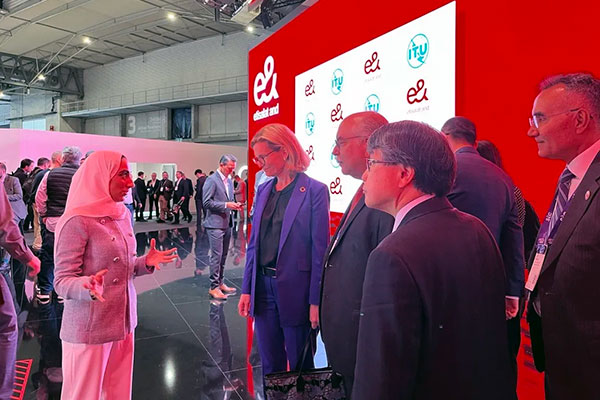
March
At a press conference in the United Nations Office at Geneva, ITU Secretary-General Doreen Bogdan-Martin highlighted ITU’s recent achievements and new four-year plan, underlining how digital communications underpin modern life. Read the SG’s opening remarks or play the press conference video.
Secretary-General Bogdan-Martin and ITU Radiocommunication Director Mario Maniewicz joined space and satellite experts at the SATELLITE 2024 in Washington, DC, where the Secretary-General called for cooperation among UN organizations and the global industry to keep space sustainable.
We also finalized the decisions of our late-2023 World Radiocommunication Conference (Acts of WRC-23) (Press release), while our Radiocommunication Advisory Group provided guidance on future work in the sector.
Meanwhile, we launched the ITU Secretary-General’s newly formed, dedicated Youth Advisory Board, bringing young leaders directly into our decision-making processes. Our fully virtual Future Networked Car Symposium explored the latest developments in vehicle connectivity and automated driving.
And the UN Secretary-General’s High-Level Advisory Body on Artificial Intelligence (AI) visited ITU, while the UN High-Level Committee on Programmes approved the UN System White Paper on AI Governance, prepared by the Inter-Agency Working Group on Artificial Intelligence co-led by ITU and UNESCO.
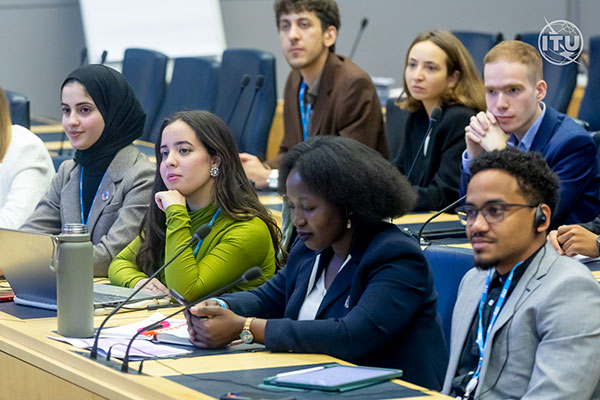
April
Girls in ICT Day on the fourth Thursday of the month brought us together with global celebrations in Manila, a simultaneous event at ITU headquarters, and numerous regional and national celebrations encouraging young women to pursue information and communication technology (ICT) careers.
Our leaders and experts also engaged with prominent journalists at an AI for Good virtual media roundtable on the ethical and societal implications of AI, a crucial topic for ITU and the whole UN system as we strive to shape a better digital future for everyone. Meanwhile, we showcased some of our latest projects and initiatives at the Balexert Expo in our host city of Geneva, Switzerland.
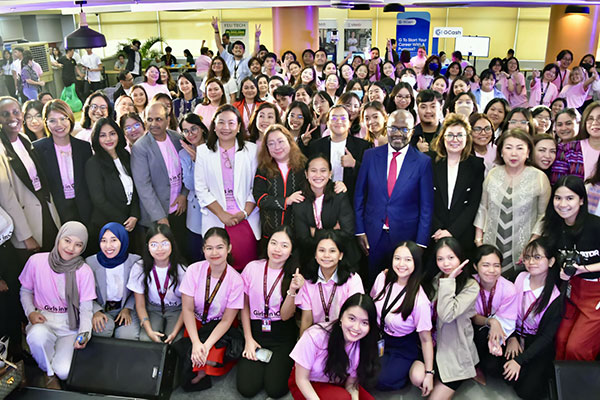
May
We marked the 159th anniversary of our founding with a focus on innovation for sustainable development in livestreamed sessions for World Telecommunication and Information Society Day on 17 May, with our Deputy Secretary-General Tomas Lamanauskas giving a memorable stand-up from the windswept ITU Tower rooftop. (We also host a nestbox there for migratory birds.)
We launched the Giga Maps initiative, aimed at mapping school connectivity worldwide, our Telecommunication Development Advisory Group met to discuss strategies for accelerating digital development inclusively and equitably around the world, and our Telecommunication Development Director Cosmas Luckyson Zavazava underscored the need for inclusive digital solutions at the UN Conference on Small Island Developing States (SIDS4). But the biggest events of the month were still to come.
The WSIS+20 Forum High-Level Event (building on the World Summit on the Information Society in 2003 and 2005) rallied governments, the private sector, UN agencies and civil society to continue forging new partnerships and keep the multistakeholder consultation process moving forward in step with rapidly evolving technologies. In parallel, our latest AI for Good Global Summit – powered by ITU with 40+ UN partners – brought together visionaries and experts from around the world to explore how artificial intelligence (AI) can help achieve the UN Sustainable Development Goals.
Rapid AI growth presents undeniable opportunities, as well as significant risks. Government and industry leaders, tech experts, and researchers from both developed and developing countries came together at our first AI Governance Day to tackle the crucial shift from principles to implementation in setting guardrails for AI development to benefit all of humanity.
We also took part in a special session on AI potential at the STI Forum (the 9th annual Multi-Stakeholder Forum on Science, Technology and Innovation for the Sustainable Development Goals) organized by the UN Economic and Social Council.
Our Radiocommunication Bureau held National Table of Frequency Allocations (NTFA) workshops for Africa and Asia-Pacific in May, with another for the Americas taking place in June, to familiarize national and regional regulators with the latest Radio Regulations.
Notably, P2C by this point surpassed USD 50 billion in public-private commitments for connectivity – halfway to our ambitious goal of USD 100 billion by 2026.
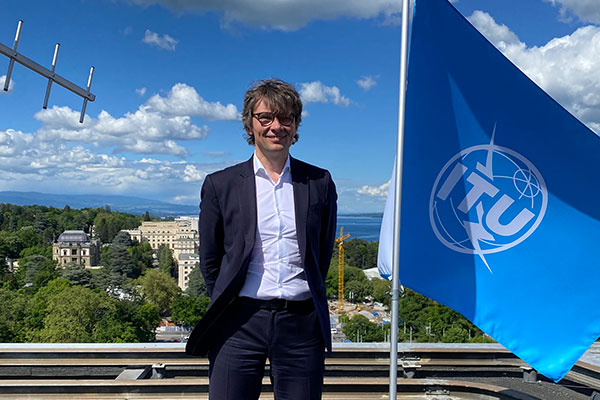
June
UN Secretary General António Guterres, in a milestone visit to ITU Headquarters, warned that AI could come to mean “Advancing Inequality” and commended our work to ensure tech benefits everyone as ITU Council 2024 reviewed our progress, set the agenda for the coming year, and endorsed our ongoing internal transformation roadmap.
We celebrated UN Virtual Worlds Day, highlighting the potential of virtual reality and metaverse platforms in education and training. And we intensified collaboration with the United Nations Industrial Development Organization (UNIDO) to cultivate digital technologies for “Industry 4.0.” At the G7 Summit, we discussed how digital can spur global economic recovery. The annual State of Broadband report from the ITU-UNESCO Broadband Commission for Sustainable Development put the spotlight on Leveraging AI for Universal Connectivity.
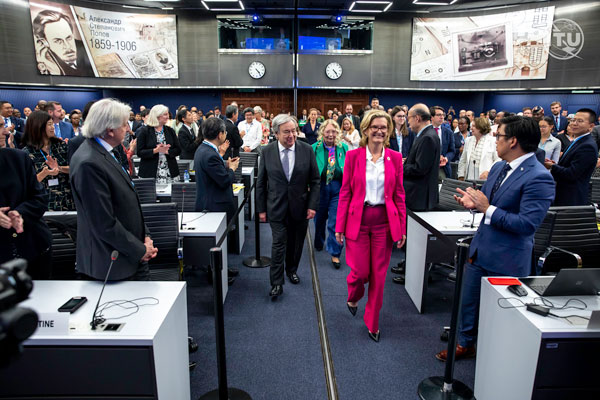
July
Our Global Symposium for Regulators (GSR-24) in Kampala, Uganda, convened digital and telecom regulators to share best practices and exchange insights on challenges and opportunities across the changing digital landscape.
At our Geneva headquarters, the first ever Giga Connectivity Forum brought together high-level representatives from education and tech ministries, as well as digital and telecom regulatory authorities, from countries engaged with the ITU-UNICEF Giga initiative for universal school connectivity. We also co-organized a photo exhibition in the UN Office at Geneva challenging gender stereotypes in tech: Not A Woman’s Job?
And at the High-Level Political Forum at UN Headquarters in New York, we highlighted the need for digital to advance sustainable development for all.
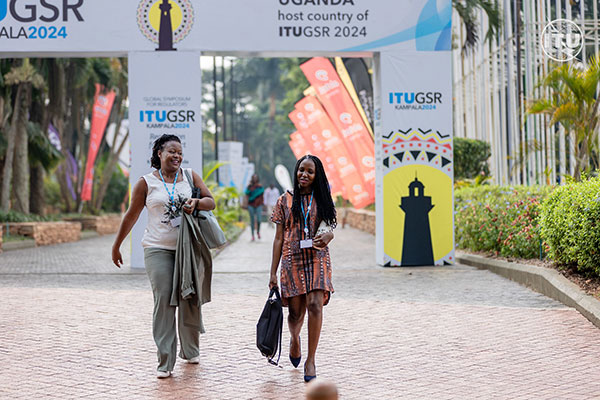
August
Our Telecommunication Standardization Advisory Group identified key issues and priorities in our work to set international technical standards for the good of all. We finalized the Radio Regulations (2024 version) based on updates decided at WRC-23, providing a comprehensive framework for spectrum management for the next four years.
The convergence of growing satellite constellations with advanced (5G and 6G) telecom networks, AI and quantum technologies could soon, yet again, revolutionize global communications.
As our host city slowed down for summer vacation, we guided a local TV crew through nearly 160 years of history in our ITU archives.
September
We started the month with our first Space Sustainability Forum, where governments, space agencies, regulators, and companies, as well as UN agencies with space-related mandates, grappled with keeping the use of outer space viable for future generations.
Then, our second SDG Digital co-organized with the United Nations Development Programme (UNDP) in New York highlighted practical digital solutions to advance progress on the Sustainable Development Goals, while the Broadband Commission called for enhanced global digital cooperation. Those sessions helped kick-off the UN’s key Summit of the Future, culminating in the adoption of the widely endorsed Pact for the Future, including the attached Global Digital Compact. Subsequent sessions at the United Nations General Assembly further emphasized the importance of inclusive digital strategies that leave no countries behind.
In a ceremony at UN Headquarters, we welcomed the Republic of Palau as our 194th Member State – bringing another key voice for developing countries and small island developing states to the ITU table. At the meeting of G20 Digital Economy Ministers in Brazil, the Maceió Ministerial Declaration underscored the value of our work for universal and meaningful connectivity.
Meanwhile, ITU Council working groups advanced our strategic planning to achieve those goals, while our Digital Skills Forum in Bahrain highlighted the importance of digital literacy and developing skills for digital transformation. And as our Cybersecurity Index 2024 made clear: Countries around the globe are improving cybersecurity efforts, but stronger actions are needed to meet evolving cyberthreats.
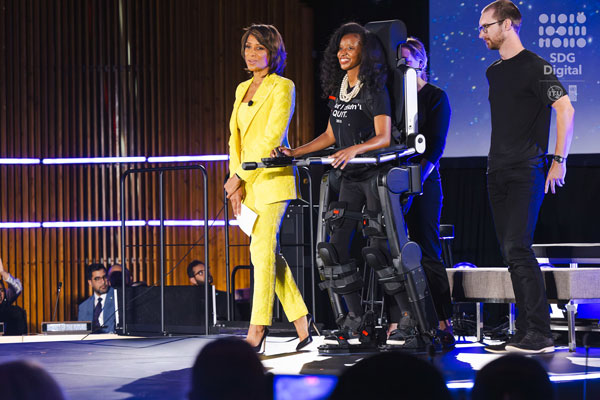
October
We started the month by co-hosting the Global DPI Summit in Cairo, with incisive sessions on developing digital public infrastructure (DPI) to serve all citizens in all countries. We then turned to our biggest conference of the year, the World Telecommunication Standardization Assembly (WTSA-24), where the ITU expert community came together for two weeks in New Delhi.
It started with a pre-conference festival of standards on 14 October (World Standards Day), with public discussions in New Delhi and online for our Global Standards Symposium (GSS-24) aimed at charting the next digital wave. Our Telecommunication Standardization Director Seizo Onoe called for cooperation on standards to advance AI for the benefit of everyone, everywhere. The next day, India’s Prime Minister Narendra Modi officially opened WTSA-24 – the governing conference for the ITU Standardization Sector (ITU-T) held every four years.
Together with our World Standards Cooperation partners ISO and IEC, we held the first International AI Standards Summit in parallel with WTSA-24. Other sessions on the sidelines explored topics like disaster risk reduction, gender barriers in tech, and AI impact in India, while innovators displayed novel solutions at our WTSA Expo. Our latest ITU Kaleidoscope academic conference showcased groundbreaking research on AI for healthcare.
To close this epic month, Malta hosted our Global Innovation Forum, dedicated to “Shaping our Digital Futures for Prosperity and Well-Being for All.”
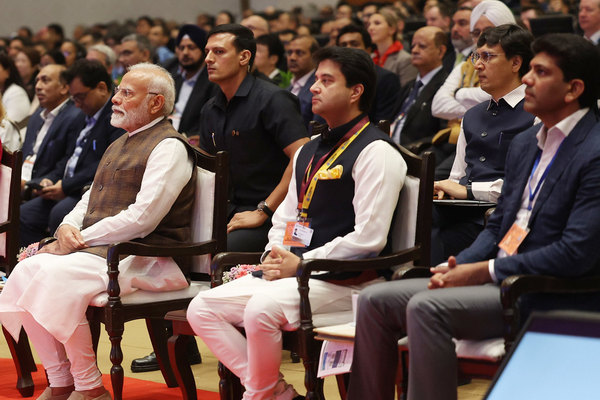
November
Digital solutions came to the fore at COP29, the UN Climate Change Conference in Baku, Azerbaijan, where our Green Digital Action initiative mobilized governments and industry to advance climate-positive digitalization. The COP29 Declaration on Green Digital Action, adopted at the first-ever COP Digitalisation Day, attracted endorsements by 75 countries and over 1,200 other stakeholders and helped mobilize major financing commitments for digital climate projects.
The Radio Regulations Board met to review our regulatory frameworks for radio spectrum and satellite orbits. We released our latest Facts & Figures report, sharing the latest ITU digital development data with the world. And in a major step to strengthen crucial global digital infrastructure, we co-founded (with the International Cable Protection Committee) the new Advisory Body for Submarine Cable Resilience representing governments, regulators, the private sector, and other stakeholders.
Secretary-General Bogdan-Martin was received by Pope Francis at the Vatican to discuss our vision of building a more inclusive, connected and compassionate world where emerging technologies serve the common good. We rounded out the month with Connecting the World from the Skies, co-hosted by the Kingdom of Saudi Arabia, where radiocommunications and space experts explored the vast potential of satellite networks to expand and enhance global connectivity.
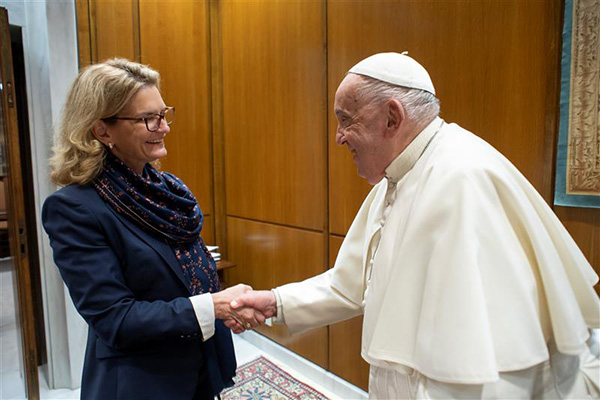
© Vatican Pool
December
Our two-day Future Radio Exhibition in Geneva displayed the latest advances in the technologies connecting our world. In parallel, our World Radiocommunication Seminar (WRS-24) delved into spectrum management issues, with a growing focus on space and satellites, ahead of our next World Radiocommunication Conference in 2027. This followed insightful Regional Radiocommunication Seminars for the CIS Region in May, the Americas in July, and Asia-Pacific in September, with more to follow for other regions in the year ahead. We put out our Maritime Manual (2024 version) with the latest guidelines for maritime communication services that are critical to the safety of people and ships at sea.
P2C continues gaining momentum with new pledges and partnerships – and we’re pleased to see total commitments through the platform exceeding USD 54 billion as we head into the new year. We also aim to mobilize massive investments in sustainable, resilient connectivity through our new Digital Infrastructure Investment Initiative, co-led by ITU with six major development finance institutions. It’s set to pick up steam under South Africa’s G20 Presidency, following strong support from Brazil to get off the ground.
We also stayed on top of AI cooperation and governance discussions, taking part in the first meeting of the Group of Friends for International Cooperation on Capacity-building of Artificial Intelligence. Finally, we celebrated the end of a successful year and the start of the holiday season.
No doubt, 2024 has put digital solutions at the forefront of international cooperation. Yet our work as the UN agency for digital technologies is far from done. As we get ready for 2025 and our 160th anniversary, we aim to turn the vision of the WSIS+20 Review and Global Digital Compact into meaningful action. Let’s optimize global communications for a new age, answer the call for enhanced ITU standards, and keep bridging digital divides worldwide. Together, we can build a better digital future for all.